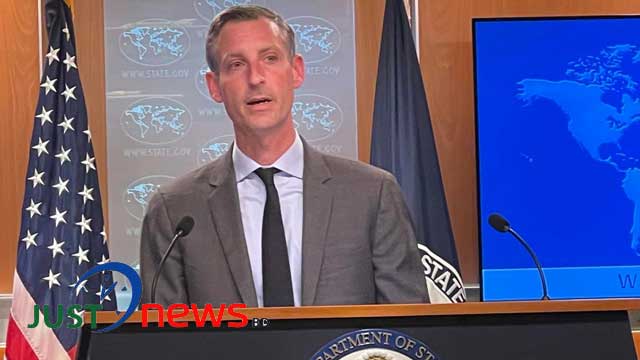M Mushfiqul Fazal, State Department correspondent
About the Russian Foreign Ministry’s remark that Russia considers the US ambassador Peter Haas’s visit to Shaheenbagh as an attempt to interfere in the internal affairs of Bangladesh, the United States on Tuesday said that they often don’t weigh in on propaganda.
The US Department of State spokesperson Ned Price made the remark while replying to a question about Russia’s recent reactions on US ambassador Peter Haas’s visit to a missing opposition party activist Sajedul Islam Sumon.
On December 14, ambassador Haas had called in at the Shaheenbagh home of missing BNP activist Sajedul Islam Sumon to meet with the families of victims of enforced disappearance.
Pointing at the rare statement issued by the Russian Embassy in Dhaka and the remarks of Russian Foreign Ministry Spokeswoman Maria Zakharova, in the press briefing, the State Department correspondent asked, “As you aware, U.S. Ambassador Peter Haas was harassed by the supporter of the ruling Awami League party while he was visiting to the home of opposition activist Sajedul Islam Sumon to meet with the families of victims of enforced disappearances. Russia believes this incident is an expected result of the activity of the American diplomat, and during the holidays, a Russian foreign ministry spokesperson characterized it as an attempt to interference in the internal affairs of Bangladesh. So is it not interference by Russia rather? And what action has been taken by the Bangladesh Government for this organized incident? As we have heard, one of the personal staff of a ruling minister orchestrated this so-called demonstration against the U.S. ambassador in Bangladesh.”
In response the State Department spokesperson said, “Look, I’m just not going to weigh in on what we have heard from Russia on this. As you know, we often don’t weigh in on propaganda.”
He further said, “What I can say from our part is that we routinely meet with a variety of stakeholders across the political spectrum in every country in which the United States has a diplomatic presence, and, of course, that includes in Bangladesh.”
Reiterating its concern over the reports of political violence in Bangladesh, Ned Price said, “The message that we’ve conveyed regarding what we’ve seen in recent months in Bangladesh has been one of concern, concern about reports of intimidation, of political violence in Bangladesh.”
“We’ve called on the government to respect and protect the fundamental freedoms of expression, of association, and peaceful assembly for the people of Bangladesh. That’s something you’ve heard from me. It’s something you’ve heard from this department. It’s something you’ve heard from our ambassador in Bangladesh. We stand by those calls, and we’ll continue to issue them. It is what we do around the world.”
In reply to another question about the unlawful arrest of opposition leaders and activists, including the house arrest of BNP chairperson Begum Khaleda Zia and BNP secretary general Mirza Alamgir the spokesperson said, “We call on the government to ensure that no party or candidate threatens, incites, or conducts violence against another party or candidate, and genuine elections require the ability of all candidates to engage voters free from violence, harassment, and intimidation.”
Urging Bangladesh government for transparent investigation into the reports of violence and unjustified detention, Ned Price further said, “When it comes to reports of violence, harassment, intimidation, unjustified detention, we call on the government to investigate these reports thoroughly, transparently, impartially, and to hold the perpetrators to account.”
MN/





